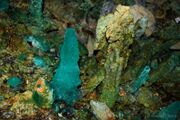Difference between revisions of "Melanterite"
Jump to navigation
Jump to search
| Line 1: | Line 1: | ||
| − | [[File:Melanterite-encrustation-baiut-1600.jpg|thumb|Melanterite stalagmites<br> | + | [[File:Melanterite-encrustation-baiut-1600.jpg|thumb|Melanterite stalagmites<br> Photo: Marek Timko]] |
== Description == | == Description == | ||
Latest revision as of 11:42, 9 December 2022
Description
The mineral form of Ferrous sulfate. Melanterite was called green vitriol and green copperas prior to 1800s. The dull, vitreous, green crystals become yellowish with exposure to air. Melanterite is brittle and has a sweetish astringent taste. It is a secondary mineral often found associated with iron pyrite or zinc and copper mines. Melanterite was used to make a black metallic pigment called melanteria.
Synonyms and Related Terms
ferrous sulfate; iron II sulfate; green vitriol; green copperas; melanteria; melanterita (Esp.)
Physical and Chemical Properties
- Cleavage is perfect in one direction and good in a second direction.
- Fracture = conchoidal.
- Streak = white.
- Luster = dull to vitreous.
- Composition = FeSO4-7H2O
- Mohs Hardness = 2.0
- Density = 1.9 g/ml
Resources and Citations
- Mineral expert: Melanterite
- Mineralogy Database: Melanterite
- C.W.Chesterman, K.E.Lowe, Audubon Society Field Guide to North American Rocks and Minerals, Alfred A. Knopf, New York, 1979
- G.S.Brady, Materials Handbook, McGraw-Hill Book Co., New York, 1971 Comment: p. 322
- Susan E. Schur, Conservation Terminology: A review of Past & Current Nomenclature of Materials, Technology and Conservation, Spring (p.34-39); Summer (p.35-38); Fall (p.25-36), 1985
